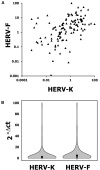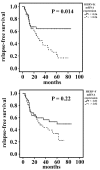Elevated HERV-K Expression in Soft Tissue Sarcoma Is Associated with Worsened Relapse-Free Survival
- PMID: 29487589
- PMCID: PMC5816752
- DOI: 10.3389/fmicb.2018.00211
Elevated HERV-K Expression in Soft Tissue Sarcoma Is Associated with Worsened Relapse-Free Survival
Abstract
A wide variety of endogenous retroviral sequences has been demonstrated in the human genome so far, divided into several different families according to the sequence homology to viral strains. While increased expression of human endogenous retrovirus (HERV) elements has already been linked to unfavorable prognosis in hepatocellular carcinoma, breast cancer, and ovarian carcinoma yet less is known about the impact of the expression of different HERV elements on sarcomagenesis in general as well as the outcome of soft tissue sarcoma (STS) patients. Therefore, in this study the association between expression of HERV-K and HERV-F and the clinicopathological characteristics in a cohort of STSs as well as the patients' prognosis was evaluated. HERV-K and HERV-F expression was assessed by quantitative real-time PCR in 120 patient specimens. HERV-K and HERV-F expression was significantly correlated (rS = 0.5; p = 6.4 × 10-9; Spearman's rank bivariate correlation). Also, tumor diameter exhibited a significant negative association to HERV-K and HERV-F expression. Levels of several hypoxia-related RNAs like HIF-1α and miR-210 showed a significant positive correlation with both HERV-K and HERV-F expression. Although in survival analyses no impact of HERV expression on disease-specific survival could be detected, patients with elevated HERV-K expression had a significantly shorter relapse-free survival (p = 0.014, log-rank analysis). In conclusion, we provide evidence for the first time that the increased expression of HERV-K in tumors is associated with STS patients' prognosis.
Keywords: HERV-Fb; HERV-K; prognosis; relapse; soft tissue sarcoma.
Figures


References
LinkOut - more resources
Full Text Sources
Other Literature Sources

